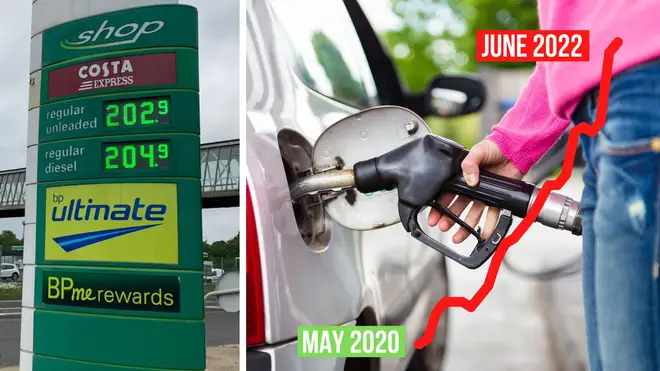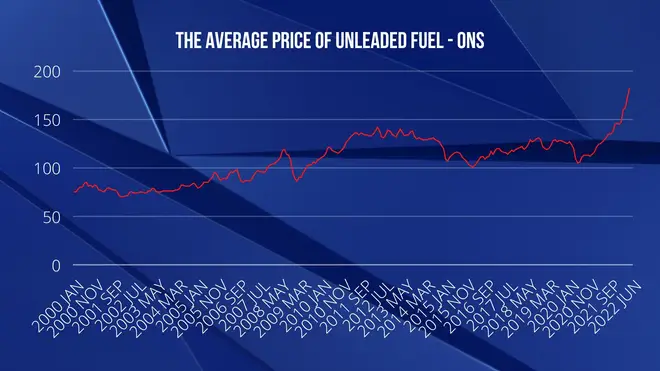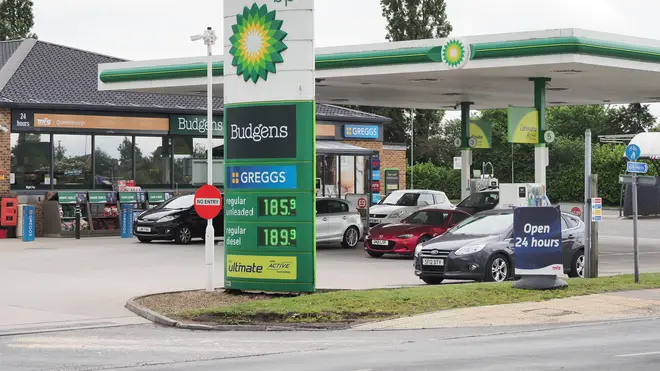
Paul Brand 10am - 12pm
9 June 2022, 09:33 | Updated: 9 June 2022, 12:04

The average cost to refill a typical family car has risen above £100 for the first time, with motorists venting their anger at being taxed twice at the pumps.
Data firm Experian Catalist revealed the grim price of 182.3p a litre was reached on Wednesday as the nation is gripped by a cost-of-living crisis.
That was a rise of 1.6p compared to Tuesday, and means a typical 55-litre family car now costs £100.27 to fill up on average.
Meanwhile, diesel soared to a record 188.1p a litre on average.
The RAC said it was a "truly dark day" for drivers.
RAC fuel spokesman Simon Williams said: "It's a truly dark day today for drivers with petrol now crossing the thoroughly depressing threshold of £100 a tank (£100.27p). A complete diesel fill-up now costs £103.43.

Why can't government reduce taxes on fuel more, Nick Ferrari asks
"With average prices so high - 182.31p for a litre of unleaded and 188.05p for diesel - there's almost certainly going to be upward inflationary pressure, which is bad news for everybody.
"While fuel prices have been setting new records on a daily basis, households up and down the country may never have expected to see the cost of filling an average-sized family car reach three figures."
He said drivers would be wondering if Chancellor Rishi Sunak would provide any more help for motorists.
Read more: Fury as petrol prices soar above £2 per litre as fuel cost hits record level
"March's 5p fuel duty cut now looks paltry as wholesale petrol costs have already increased by five times that amount since the Spring Statement (25p)," he said.

"A further duty cut or a temporary reduction in VAT would go a long way towards helping drivers, especially those on lower incomes who have no choice other than to drive."
Drivers have voiced their anger at being taxed twice at the pumps as they shell out 53p on every litre, but VAT is also levied on the total bill.
Gordon Balmer from the Fuel Retailers Association said the government needs to consider further cuts to fuel duty and VAT.
One furious motorist wrote: "The government have to take immediate action over fuel prices in this country £2 a litre is crippling the whole economy. There should be an immediate cut in fuel tax to counter act the cost of fuel whilst there is so much uncertainty."
Another posted online: "A temporary reduction in fuel duty to 20% and reduction in VAT to 15% would reduce the fuel cost by 22%. Saving approx. 41p on a 1.88 litre of petrol. In turn, returning prices to those paid in Dec 2021. Tories raking it in while the rest suffer!"
A third posted a picture after paying £100 for 56 litres of petrol, writing: "Out of my £100 • £16.67 is VAT• £32.74 is fuel duty • £35.84 for the wholesaler • £9.71 is biofuel content • £3.92 to the retailer • £1.12 is delivery costs. Nearly £50 in tax alone!"
It comes as levelling up secretary Michael Gove admitted the Government's 5p fuel duty cut had been "completely" wiped out by soaring prices.

He told LBC's Nick Ferrari at Breakfast: "I'm not for a moment denying the pressures that households are facing, they're very real, and Government can help, but when we're facing the sort of problems that we have in the energy market as a result of the war in Ukraine, then it is very difficult for everyone."
But he insisted Boris Johnson and Chancellor Rishi Sunak want to cut the burden on Brits as they face soaring prices and bills in the cost of living crisis.
Mr Gove said: "The Chancellor and the PM want to and will introduce tax cuts, but the Chancellor would kill me if I announced anything before he did."
Read more: The UK travel chaos could become a full-blown national crisis, says Andrew Marr
But he said fuel duty was still needed by the Government to pay for public services.
Russia's invasion of Ukraine increased the cost of oil, which triggered a knock on effect on the price at the pumps.
It keeps soaring because of increased demand for fuel across the world, with China easing Covid restrictions while the US and Europe enter the peak summer driving season.